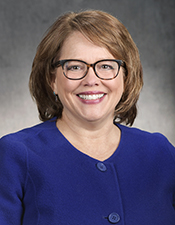$100 million in new money, increased college access part of higher ed bill approved in committee
A plan to expand postsecondary opportunities for more Minnesotans got a passing grade Wednesday.
Sponsored by Rep. Connie Bernardy (DFL-New Brighton), a delete-all amendment to HF3872, as further amended technically, was approved 11-6 along party lines by the House Higher Education Finance and Policy Committee.
On its way to the House Ways and Means Committee, the omnibus higher education finance and policy bill would provide $100 million in supplemental funding in fiscal year 2023, with $57.46 million going to the Office of Higher Education, $32.53 million to the University of Minnesota, and $10 million to the Minnesota State system.
[MORE: View the spreadsheet]
The bill would open doors and opportunities for Minnesota students and their families, helping them get their education credentials and employable skills for long-term economic prosperity of the state, Bernardy said.
Rep. Michael Howard (DFL-Richfield) called the bill a targeted effort to help students afford college. “It’s incredibly reasonable.”
Lifting the “most needy” is the right thing to do, so no one is left out, added Rep. Mohamud Noor (DFL-Mpls).
In part, the bill would create a grant program for state college students that would cover any remaining tuition and fees based on the recipient’s reported family income. It would also create a grant program to assist in creating or expanding postsecondary programs for students with intellectual disabilities.
It would add $3.24 million for American Indian scholarships, $1.5 million for grants to underrepresented student teachers, $731,000 for student emergency assistance, and $493,000 to the state grant program.
[MORE: Additional bill details]
Republicans see some positives, but also note the bill is lacking in a number of areas.
For example, Rep. Jon Koznick (R-Lakeville) wondered about a lack of tuition freezes at four-year colleges. Families who pay through for their wards would ultimately bear the cost of eliminating tuition for lower and middle income students at two-year colleges as proposed in the bill, he said.
Rep. Marion O'Neill (R-Maple Lake) said the systems always ask for more funding, but it doesn’t always directly benefit students first. She said the University of Minnesota recently raised tuition by 1.5% while giving raises to administrators.
Sympathetic to their funding needs, Rep. Sondra Erickson (R-Princeton) said it’s a violation of state statute to directly appropriate funds for the operation of tribal colleges that are not under state’s jurisdiction. “We would need specific policy to support that.”
The companion, SF3510, sponsored by Sen. David Tomassoni (I-Chisholm), awaits action by the Senate Finance Committee.
Related Articles
Search Session Daily
Advanced Search OptionsPriority Dailies
Legislative leaders set 2026 committee deadlines
By Lisa Kaczke Legislative leaders on Tuesday officially set the timeline for getting bills through the committee process during the upcoming 2026 session.
Here are the three deadlines for...
Legislative leaders on Tuesday officially set the timeline for getting bills through the committee process during the upcoming 2026 session.
Here are the three deadlines for...
Latest budget forecast projects nearly $2.5 billion surplus, but red ink down the road
By Mike Cook Three weeks before Christmas, state budget officials provided some merriment to Minnesotans. However, Grinch-like transformations lurk.
Released Thursday, the November ...
Three weeks before Christmas, state budget officials provided some merriment to Minnesotans. However, Grinch-like transformations lurk.
Released Thursday, the November ...
